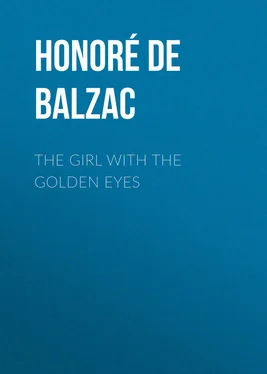Honoré Balzac - The Girl with the Golden Eyes
Здесь есть возможность читать онлайн «Honoré Balzac - The Girl with the Golden Eyes» — ознакомительный отрывок электронной книги совершенно бесплатно, а после прочтения отрывка купить полную версию. В некоторых случаях можно слушать аудио, скачать через торрент в формате fb2 и присутствует краткое содержание. Жанр: literature_19, foreign_antique, foreign_prose, на английском языке. Описание произведения, (предисловие) а так же отзывы посетителей доступны на портале библиотеки ЛибКат.
- Название:The Girl with the Golden Eyes
- Автор:
- Жанр:
- Год:неизвестен
- ISBN:нет данных
- Рейтинг книги:5 / 5. Голосов: 1
-
Избранное:Добавить в избранное
- Отзывы:
-
Ваша оценка:
- 100
- 1
- 2
- 3
- 4
- 5
The Girl with the Golden Eyes: краткое содержание, описание и аннотация
Предлагаем к чтению аннотацию, описание, краткое содержание или предисловие (зависит от того, что написал сам автор книги «The Girl with the Golden Eyes»). Если вы не нашли необходимую информацию о книге — напишите в комментариях, мы постараемся отыскать её.
The Girl with the Golden Eyes — читать онлайн ознакомительный отрывок
Ниже представлен текст книги, разбитый по страницам. Система сохранения места последней прочитанной страницы, позволяет с удобством читать онлайн бесплатно книгу «The Girl with the Golden Eyes», без необходимости каждый раз заново искать на чём Вы остановились. Поставьте закладку, и сможете в любой момент перейти на страницу, на которой закончили чтение.
Интервал:
Закладка:
Upon one of those fine spring mornings, when the leaves, although unfolded, are not yet green, when the sun begins to gild the roofs, and the sky is blue, when the population of Paris issues from its cells to swarm along the boulevards, glides like a serpent of a thousand coils through the Rue de la Paix towards the Tuileries, saluting the hymeneal magnificence which the country puts on; on one of these joyous days, then, a young man as beautiful as the day itself, dressed with taste, easy of manner – to let out the secret he was a love-child, the natural son of Lord Dudley and the famous Marquise de Vordac – was walking in the great avenue of the Tuileries. This Adonis, by name Henri de Marsay, was born in France, when Lord Dudley had just married the young lady, already Henri’s mother, to an old gentleman called M. de Marsay. This faded and almost extinguished butterfly recognized the child as his own in consideration of the life interest in a fund of a hundred thousand francs definitively assigned to his putative son; a generosity which did not cost Lord Dudley too dear. French funds were worth at that time seventeen francs, fifty centimes. The old gentleman died without having ever known his wife. Madame de Marsay subsequently married the Marquis de Vordac, but before becoming a marquise she showed very little anxiety as to her son and Lord Dudley. To begin with, the declaration of war between France and England had separated the two lovers, and fidelity at all costs was not, and never will be, the fashion of Paris. Then the successes of the woman, elegant, pretty, universally adored, crushed in the Parisienne the maternal sentiment. Lord Dudley was no more troubled about his offspring than was the mother, – the speedy infidelity of a young girl he had ardently loved gave him, perhaps, a sort of aversion for all that issued from her. Moreover, fathers can, perhaps, only love the children with whom they are fully acquainted, a social belief of the utmost importance for the peace of families, which should be held by all the celibate, proving as it does that paternity is a sentiment nourished artificially by woman, custom, and the law.
Poor Henri de Marsay knew no other father than that one of the two who was not compelled to be one. The paternity of M. de Marsay was naturally most incomplete. In the natural order, it is but for a few fleeting instants that children have a father, and M. de Marsay imitated nature. The worthy man would not have sold his name had he been free from vices. Thus he squandered without remorse in gambling hells, and drank elsewhere, the few dividends which the National Treasury paid to its bondholders. Then he handed over the child to an aged sister, a Demoiselle de Marsay, who took much care of him, and provided him, out of the meagre sum allowed by her brother, with a tutor, an abbe without a farthing, who took the measure of the youth’s future, and determined to pay himself out of the hundred thousand livres for the care given to his pupil, for whom he conceived an affection. As chance had it, this tutor was a true priest, one of those ecclesiastics cut out to become cardinals in France, or Borgias beneath the tiara. He taught the child in three years what he might have learned at college in ten. Then the great man, by name the Abbe de Maronis, completed the education of his pupil by making him study civilization under all its aspects: he nourished him on his experience, led him little into churches, which at that time were closed; introduced him sometimes behind the scenes of theatres, more often into the houses of courtesans; he exhibited human emotions to him one by one; taught him politics in the drawing-rooms, where they simmered at the time, explained to him the machinery of government, and endeavored out of attraction towards a fine nature, deserted, yet rich in promise, virilely to replace a mother: is not the Church the mother of orphans? The pupil was responsive to so much care. The worthy priest died in 1812, a bishop, with the satisfaction of having left in this world a child whose heart and mind were so well moulded that he could outwit a man of forty. Who would have expected to have found a heart of bronze, a brain of steel, beneath external traits as seductive as ever the old painters, those naive artists, had given to the serpent in the terrestrial paradise? Nor was that all. In addition, the good-natured prelate had procured for the child of his choice certain acquaintances in the best Parisian society, which might equal in value, in the young man’s hand, another hundred thousand invested livres. In fine, this priest, vicious but politic, sceptical yet learned, treacherous yet amiable, weak in appearance yet as vigorous physically as intellectually, was so genuinely useful to his pupil, so complacent to his vices, so fine a calculator of all kinds of strength, so profound when it was needful to make some human reckoning, so youthful at table, at Frascati, at – I know not where, that the grateful Henri de Marsay was hardly moved at aught in 1814, except when he looked at the portrait of his beloved bishop, the only personal possession which the prelate had been able to bequeath him (admirable type of the men whose genius will preserve the Catholic, Apostolic, and Roman Church, compromised for the moment by the feebleness of its recruits and the decrepit age of its pontiffs; but if the church likes!).
Конец ознакомительного фрагмента.
Текст предоставлен ООО «ЛитРес».
Прочитайте эту книгу целиком, купив полную легальную версию на ЛитРес.
Безопасно оплатить книгу можно банковской картой Visa, MasterCard, Maestro, со счета мобильного телефона, с платежного терминала, в салоне МТС или Связной, через PayPal, WebMoney, Яндекс.Деньги, QIWI Кошелек, бонусными картами или другим удобным Вам способом.
Интервал:
Закладка:
Похожие книги на «The Girl with the Golden Eyes»
Представляем Вашему вниманию похожие книги на «The Girl with the Golden Eyes» списком для выбора. Мы отобрали схожую по названию и смыслу литературу в надежде предоставить читателям больше вариантов отыскать новые, интересные, ещё непрочитанные произведения.
Обсуждение, отзывы о книге «The Girl with the Golden Eyes» и просто собственные мнения читателей. Оставьте ваши комментарии, напишите, что Вы думаете о произведении, его смысле или главных героях. Укажите что конкретно понравилось, а что нет, и почему Вы так считаете.












